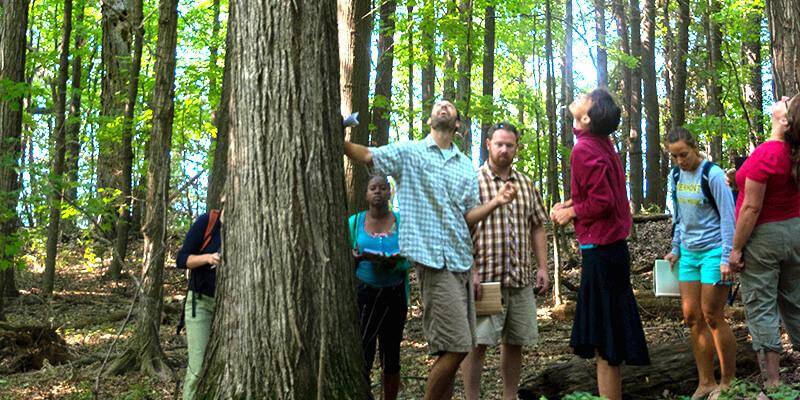If there was a yellow brick road leading to ultimate protection for the third planet from the Sun, it might look like the Master’s in Leadership for Sustainability (MLS) at the Rubenstein School of Environment and Natural Resources (RSENR) — and thanks to a recent University of Vermont Board of Trustees approval, it’s shinier than ever.
Now known as the Master’s of Professional Studies in Leadership for Sustainability, the two-year program is the first at UVM to receive such a designation, validating the dedication of its students, who hail from across the U.S., and its nationwide network of visionaries finding new ways to help Earth thrive.
“This gives the program a more appropriate home in terms of a graduate degree,” explains Director Matt Kolan. “So many of our students are really firmly rooted in leadership roles and professional fields that are focused on catalyzing change, and a master’s of professional studies more accurately reflects the kind of learning and support that this ecosystem provides them in order to step more fully into their calling in the world.”
Ashley Eaton, part of the “first batch” or inaugural cohort of MLS students, says that the program gave her tremendous perspective and insight for the work she is currently doing on education and water quality. “It is unique in that it’s leveraging the strengths of UVM and the Rubenstein School in areas that need national attention,” says Eaton, who works for RSENR at the Rubenstein Ecosystem Science Lab next to ECHO, Leahy Center for Lake Champlain in Burlington.
Among the coast-to-coast partners for the Master’s of Professional Studies in Leadership for Sustainability are the Berkeley-based Thousand Currents (which has worked with more than 750 grassroots groups in the Global South), iLEAP in Seattle, the Black/Land Project, and Vermont’s own Shelburne Farms.
Kolan points to Thousand Currents executive director Rajasvini Bhansali as an example of an ideal affiliate who provides valuable mentoring. “She has an enormous body of experience about what it takes to create reciprocal partnerships,” he says, “and to practice solidarity in ways that are intersectional, addressing key environmental concerns, social concerns and levels of oppression that operate in various identities and spheres.”
On the flip side, partners such as Sayra Pinto of MassCircles are reaping benefits from the collaboration, as well. “I love being an affiliate of the MLS program because it connects me with students and colleagues from around the country and world meaningfully,” says Pinto. “By engaging students, I learn about the challenges we are facing as a culture in our efforts to continue to transform our society. By engaging colleagues, I am inspired to continue to improve my work in the world. This is a unique program and a rare opportunity for transformative engagement with ourselves and nature as our teacher.”
The two-year, low-residency program (recently highlighted in Insight Into Diversity and in Diverse) includes retreats in Vermont, San Francisco’s Bay Area, and Washington, D.C. The program focuses on five key pillars ranging from leadership inspired by the wisdom of nature to applied areas of specialization in ecological leadership, education for sustainability, and ecological economics. That, coupled with the professional affiliates who help support module development for some of the online courses, serve as through-line coaches for student capstone projects, and deliver guest lectures, makes UVM’s now professional MLS truly unique, says Kolan. “There are very few graduate programs in the natural resources and environment fields that actively take on racism, patriarchy and other systems of oppression,” he says.
With Emil Tsao, former Master’s student and current PhD student in the Rubenstein School, serving as program coordinator and nearly 60 individuals in its immediate network, the Master’s of Professional Studies in Leadership for Sustainability is now midway through its third year, recruiting its fourth batch of students. “From its inception, this hybrid model to build full academic and professional capacities has been emergent,” says Eaton. “This is just the beginning.”
